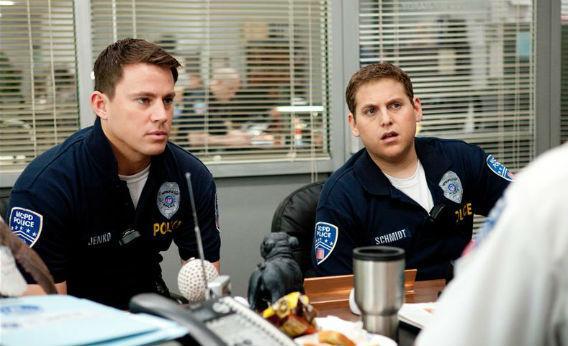In the new movie 21 Jump Street, which opened Friday, fresh-faced cops go undercover as students in a local high school to try to bring down a drug ring. The officers—one a jock, the other a nerd—throw a wild house party, reasoning that it’s the quickest way to get in good with the popular kids in school. One strikes up a flirtatious friendship with a drug dealer’s girlfriend; the other befriends the science geeks to get help on his homework. What do real-life cops do to blend in when they go undercover as high schoolers?
Look sullen, crack jokes, and get bad grades. While fitting in and making connections is important for undercover officers, it’s more important that their fellow students don’t realize they’re narcs. Officers adopt different strategies depending on their real-life personalities, but one obvious way to head off suspicion is to act as un-coplike as possible.
That could mean telling peers that their parents forced them to transfer because they broke the law, or fell in with a rough crowd at their last school. In their first few days, they might act quiet or circumspect, both to get a feel for the situation and to avoid attracting undue attention. But soon they might try to establish a reputation as a rebel, sitting at the back of the class, wearing baggy clothes, and talking back to their teachers. Some cheat on homework assignments; others sleep in class or flip through a copy of High Times. One female officer told a University of Missouri-St. Louis criminology researcher that when the teacher asked her to go up to a map and identify Africa, she pointed to Canada, prompting students to tease her about being dumb or on drugs. While such acts might not make a narc the most popular kid on campus, they establish her credibility among the burnouts. The best strategy depends partly on the group you’re trying to infiltrate, though. A Palm Beach officer told reporters that as an actual high-school student he had joined the high-school choir and made average grades; as an undercover office, he sneaked out of class and got suspended.*
Appearance is also crucial. While police departments might prefer to give undercover assignments to officers with some experience, they’re often forced to go with brand-new recruits for high-school assignments, because they’re the only ones who look young enough to pass. In a 2004 case in Alamance County, N.C., a local police chief gave an undercover assignment to a 21-year-old who had just applied for a job—keeping his hiring a secret even from his fellow officers by swearing him in from the back seat of a car.* Some experts say an officer’s lack of experience can work in his favor; a rookie cop is less likely to accidentally blurt out police jargon such as “10-4.”
Shaggy hair, skateboard shoes, and chain wallets are popular accessories. The formula isn’t hard-and-fast, though. Experts recommend that officers choose a persona that’s not too far removed from their real one, to minimize the amount of acting necessary. A name that sounds like their own is also a good touch, offering plausible deniability in case they accidentally speak or respond to their real name.
For the same reason, training for new undercover officers tends to be minimal (though some departments have beefed up their training programs in response to botched cases or stings gone awry). Narcotics detectives show them how to identify and buy drugs, and legal experts brief them on entrapment and other laws. In some cases a youth-culture consultant will advise them on attire or slang, though if the officers are young enough, that tends to be unnecessary. A few departments hire professional actors to give acting lessons, since going undercover is essentially a sustained dramatic performance. Two Los Angeles County sheriff’s deputies who went undercover at ages 29 and 30 had to spend the summer before enrollment reading Seventeen magazine, watching MTV, and hanging out in food courts—and they were still widely suspected of being narcs. That’s not the end of the world, however; undercover cops often report that students accuse them of being snitches, then sell them drugs anyway.
Working too hard to befriend people is not recommended, since it can arouse suspicion and lead to emotional entanglements. Other no-no’s include joining sports teams, actually using the drugs they buy, and dating students—not that those things don’t sometimes happen.
Got a question about today’s news? Ask the Explainer.
Explainer thanks Joseph Pollini of John Jay College of Criminal Justice.
Correction, Mar. 19, 2012: This article originally placed Alamance County in Georgia. (Return to corrected sentence.) It also originally stated that a Palm Beach police officer joined the choir and made average grades in his first undercover assignment as a high school student. According to the article, he did these things in his real high-school days, not in the course of an undercover assignment. (Return to corrected sentence.)
